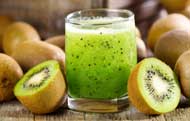
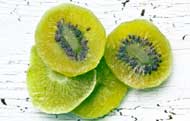

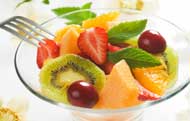
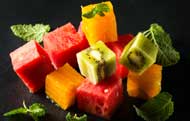
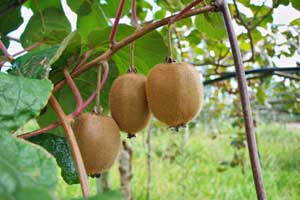
1. Kiwifruit Facts
2. Types of Kiwifruit
3. Nutritional Value of Kiwifruit
4. Health Benefits of Kiwifruit
The most common kiwifruit is Actinidia deliciosa, while other varieties like yellow kiwifruit are Actinidia chinensis. Both are from the genus Actinidia and belong to the Actinidiaceae family.
Kiwifruit (often shortened to kiwi), or Chinese gooseberry is the edible berry of several species of woody vines in the genus Actinidia. The most common cultivar group of kiwifruit (Actinidia chinensis var. deliciosa 'Hayward' is oval, about the size of a large hen's egg: 5–8 centimetres (2–3 inches) in length and 4.5–5.5 cm (1+3⁄4–2+1⁄4 in) in diameter. Kiwifruit has a thin, fuzzy, fibrous, light brown skin that is tart but edible, and light green or golden flesh that contains rows of tiny black edible seeds. The fruit has a soft texture with a sweet and unique flavour.
History and Origin
Kiwifruit originated in central and eastern China, where it was known as the "Chinese gooseberry", with the first recorded description dating back to the 12th century during the Song dynasty. In the early 20th century, cultivation of kiwifruit spread from China to New Zealand, where the first commercial plantings took place. It gained popularity among British and American servicemen stationed in New Zealand during World War II, and later became commonly exported, first to the United Kingdom and Australia from 1953 followed by California in 1959.
- • Hayward
- • SunGold
- • Red kiwifruit
- • Kiwiberries
The main types of kiwifruit grown and sold in Australia are the fuzzy green Hayward variety and the smooth-skinned gold varieties like SunGold. While Hayward is the most common green type, there are also other, less common varieties grown, including red kiwifruit and kiwiberries (a smaller, hardier type).
Green kiwifruit
Hayward: This is the most widely grown and sold green kiwifruit, known for its large size, fuzzy brown skin, and tangy-sweet green flesh.
Flavour: The Hayward kiwi has a sweet, tangy, and juicy flavour with bright green flesh and a brown, fuzzy skin. Its taste is often described as a mix between sweet and sour, sometimes compared to a gooseberry or strawberry. When fully ripe, the flesh is soft and succulent
Other green kiwifruit varieties are also grown, but the Hayward variety is the dominant one.
Golden kiwifruit
SunGold: A popular gold variety that is sweeter and has a tropical flavour, with smooth, fuzz-free skin.
Flavour: SunGold kiwi has a tropical and sweet flavour, often compared to a cross between a mango and a strawberry. This is different from a traditional green kiwi, which has a more tangy and citrusy taste.
Golden kiwis are grown locally in Australia, though their supply is often supplemented with imports from New Zealand.
Red kiwifruit
Red kiwifruit: A smaller, niche fruit that is grown on a smaller scale in Australia and can be found at specialty stores or farmers' markets.
Flavour: Red kiwifruit has a berry-like flavour that is sweet and less tangy than green kiwis, often compared to a blend of raspberry and strawberry with a hint of citrus. It has a juicy, smooth texture with a slightly creamy quality and is sometimes described as tasting like a very sweet, mild, tropical kiwi.
Kiwiberries: Also known as hardy kiwifruit, these are small, smooth-skinned fruits that can tolerate cold weather and are grown across a wide range of climates in Australia.
Kiwiberries have a sweet and tangy flavour similar to a kiwi, often with tropical notes of strawberry, passion fruit, pineapple, or mango. Their taste is intensified by the juicy and acidic.
Fruit ” Kiwifruit ” ( Nutritional value )
Nutritional value per 100 g
Kiwifruit, green, raw
|
Nutrient ( Proximate’s )
|
Unit
|
Value
|
Daily Value %
|
|
Energy
|
kcal
|
61
|
3.0%
|
|
Protein
|
g
|
1.14
|
2.2%
|
|
Total lipid (fat)
|
g
|
0.52
|
0.6%
|
|
Carbohydrate, by difference
|
g
|
14.66
|
5.3%
|
|
Fiber, total dietary
|
g
|
3.0
|
10.7%
|
|
Sugars, total
|
g
|
8.99
|
|
|
Minerals
|
|||
|
Calcium, Ca
|
mg
|
34
|
2.6%
|
|
Iron, Fe
|
mg
|
0.31
|
1.7%
|
|
Magnesium, Mg
|
mg
|
17
|
4.0%
|
|
Phosphorus, P
|
mg
|
34
|
2.7%
|
|
Potassium, K
|
mg
|
312
|
6.6%
|
|
Sodium, Na
|
mg
|
3
|
0.1%
|
|
Zinc, Zn
|
mg
|
0.14
|
1.2%
|
|
Copper, Cu
|
mg
|
0.130
|
14.4%
|
|
Manganese, Mn
|
mg
|
0.098
|
4.2%
|
|
Selenium, Se
|
mcg
|
0.2
|
0.3%
|
|
Vitamins
|
|||
|
Vitamin C, total ascorbic acid
|
mg
|
92.7
|
103%
|
|
Thiamin (B-1)
|
mg
|
0.027
|
2.2%
|
|
Riboflavin (B-2)
|
mg
|
0.025
|
1.9%
|
|
Niacin (B-3)
|
mg
|
0.341
|
2.1%
|
|
Pantothenic acid (B-5)
|
mg
|
0.183
|
3.6%
|
|
Vitamin B-6
|
mg
|
0.063
|
3.7%
|
|
Vitamin B-12
|
mg
|
0.00
|
|
|
Folate DFE (dietary folate) (B-9)
|
mcg
|
25
|
6.2%
|
|
Vitamin A, RAE (retinol)
|
mcg
|
4
|
0.4%
|
|
Vitamin E (alpha-tocopherol)
|
mg
|
1.46
|
9.7%
|
|
Vitamin D (D2 + D3)
|
mcg
|
0
|
|
|
Vitamin K (phylloquinone)
|
mcg
|
40.3
|
33.5%
|
|
Lipids
|
|||
|
Saturated Fatty Acids
|
g
|
0.029
|
0.1%
|
|
Monounsaturated Fatty Acids
|
g
|
0.047
|
|
|
Polyunsaturated Fatty Acids
|
g
|
0.287
|
|
|
Trans Fatty Acids
|
g
|
0.000
|
|
|
Carotenoids
|
|||
|
Beta-Carotene
|
mcg
|
52
|
|
|
Lutein + zeaxanthin
|
mcg
|
122
|
|

|
Reference Values are based on a 2,000 Calorie Intake, for Adults and Children 4 or More Years of Age. Your daily values may be higher or lower depending on your calorie needs.
|
|
Percentages are roughly approximated using (RDA) Recommended Dietary Allowances for adults. Source: Nutrient Database – USDA (United States Department of Agriculture)
|
|
Reference Values for Nutrition – FDA U.S. Food and Drug Administration
|
Kiwifruit Nutritional Value
Kiwifruit offers numerous health benefits, including supporting immune function through high vitamin C content, improving digestive health with fiber and digestive enzymes like actinidin, and promoting heart health by helping to lower blood pressure and cholesterol. They are also a source of antioxidants, potassium, and other vitamins that can benefit sleep, skin, and eye health.
- PROMOTES SKIN HEALTH
Kiwifruit is high in vitamin C, which stimulates collagen production for firmness, and antioxidants that protect against sun damage and aging. Additionally, vitamin E and omega-3 fatty acids help moisturize and soothe the skin, while the fruit's antibacterial properties can aid in controlling oil production and reducing acne. Eating kiwifruit can contribute to a healthier, more vibrant complexion, and the skin itself is packed with even more antioxidants, fiber, and folate. - IMPROVES HYDRATION
Kiwifruit improves hydration because it is about 85-90% water and also contains potassium, which helps the body regulate fluid balance. The fruit's fiber also helps with hydration by swelling and retaining water in the digestive system, which can soften stools and aid in bowel regularity. - SUPPORTS EYE HEALTH
Kiwifruit supports eye health due to its high content of lutein, zeaxanthin, and vitamin C, which help protect against cataracts and age-related macular degeneration by acting as antioxidants and aiding vision in dim light. The fruit also contains copper and vitamin A precursors, which are vital for retinal health and overall vision. - SOOTHES RESPIRATORY ISSUES
Kiwifruit can help soothe respiratory issues due to its high antioxidant and vitamin C content, which may reduce inflammation and improve respiratory function. Studies suggest it may help with symptoms of asthma and upper respiratory tract infections. - BENEFICIAL FOR BLOOD SUGAR
Kiwifruit can be beneficial for blood sugar management due to its low glycaemic index (GI) and high fiber content, which slows the absorption of sugar into the bloodstream. Eating kiwifruit, especially whole fruit rather than juice, can help regulate blood sugar levels and is a nutrient-rich alternative to high-carbohydrate foods. The soluble fiber in kiwis forms a gel, slowing down digestion and sugar uptake, and the insoluble fiber aids in regular bowel movements.
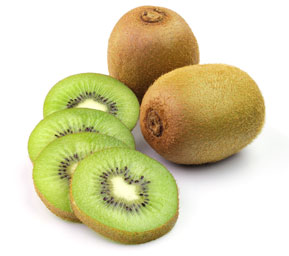
- BENEFITS HEART HEALTH
Kiwifruit benefits heart health through its high fiber, potassium, and antioxidant content, which can lower blood pressure, reduce cholesterol, and prevent blood clots. Studies suggest consuming 2–3 kiwis daily may improve blood lipid profiles, lower blood pressure, and decrease platelet hyperactivity. - SUPPORTS THE IMMUNE SYSTEM
Kiwifruit supports the immune system primarily due to its high vitamin C content, which helps immune cells function properly and protects against oxidative damage. Consuming kiwifruit can also reduce the incidence and severity of symptoms from upper respiratory tract infections thanks to its vitamins C and E, and other nutrients like antioxidants and folate. - BENEFITS DIGESTIVE HEALTH
Kiwifruit benefits digestive health due to its high fiber content and the enzyme actinidin, which helps with protein digestion. These components improve constipation by softening and bulking stool, increasing bowel movement frequency, and promoting faster gastrointestinal transit. Kiwifruit can also help reduce symptoms like bloating, abdominal discomfort, and flatulence - CAN IMPROVE SLEEP QUALITY
Kiwifruit can improve sleep quality because it contains compounds that promote sleep, such as serotonin and natural melatonin, along with polyphenols and other vitamins. Studies suggest that eating two kiwis an hour before bed can help you fall asleep faster, sleep longer, and wake up less during the night. The fruit's high content of folate may also contribute, as lower folate levels have been linked to insomnia. - SUPPORTS WEIGHT MANAGEMENT
Kiwifruit can support weight management by promoting fullness due to its high fiber and water content, which helps you eat less and avoid unhealthy snacking. It is low in calories and a nutritious, low-sugar alternative to other snacks. Additionally, some research suggests kiwifruit can help slow down sugar uptake, leading to more stable blood sugar levels.
References
Nutrient Database – USDA (United States Department of Agriculture)
Reference Values for Nutrition – FDA U.S. Food and Drug Administration
Supports the Immune system - Kiwifruit supports the immune system primarily due to its high vitamin C content, which helps immune cells function properly and protects against oxidative damage. Consuming kiwifruit can also reduce the incidence and severity of symptoms from upper respiratory tract infections thanks to its vitamins C and E, and other nutrients like antioxidants and folate.
Benefits Digestive health - Kiwifruit benefits digestive health due to its high fiber content and the enzyme actinidin, which helps with protein digestion. These components improve constipation by softening and bulking stool, increasing bowel movement frequency, and promoting faster gastrointestinal transit. Kiwifruit can also help reduce symptoms like bloating, abdominal discomfort, and flatulence.
Benefits Heart health - Kiwifruit benefits heart health through its high fiber, potassium, and antioxidant content, which can lower blood pressure, reduce cholesterol, and prevent blood clots. Studies suggest consuming 2–3 kiwis daily may improve blood lipid profiles, lower blood pressure, and decrease platelet hyperactivity.
Can improve Sleep quality - Kiwifruit can improve sleep quality because it contains compounds that promote sleep, such as serotonin and natural melatonin, along with polyphenols and other vitamins. Studies suggest that eating two kiwis an hour before bed can help you fall asleep faster, sleep longer, and wake up less during the night. The fruit's high content of folate may also contribute, as lower folate levels have been linked to insomnia.
Promotes Skin health - Kiwifruit promotes skin health due to its high content of vitamin C, which stimulates collagen production for firmness, and antioxidants that protect against sun damage and aging. Additionally, vitamin E and omega-3 fatty acids help moisturize and soothe the skin, while the fruit's antibacterial properties can aid in controlling oil production and reducing acne. Eating kiwifruit can contribute to a healthier, more vibrant complexion, and the skin itself is packed with even more antioxidants, fiber, and folate.
Supports Eye health - Kiwifruit supports eye health due to its high content of lutein, zeaxanthin, and vitamin C, which help protect against cataracts and age-related macular degeneration by acting as antioxidants and aiding vision in dim light. The fruit also contains copper and vitamin A precursors, which are vital for retinal health and overall vision.
Supports Weight management - Kiwifruit can support weight management by promoting fullness due to its high fiber and water content, which helps you eat less and avoid unhealthy snacking. It is low in calories and a nutritious, low-sugar alternative to other snacks. Additionally, some research suggests kiwifruit can help slow down sugar uptake, leading to more stable blood sugar levels.
Beneficial for blood sugar - Kiwifruit can be beneficial for blood sugar management due to its low glycaemic index (GI) and high fiber content, which slows the absorption of sugar into the bloodstream. Eating kiwifruit, especially whole fruit rather than juice, can help regulate blood sugar levels and is a nutrient-rich alternative to high-carbohydrate foods. The soluble fiber in kiwis forms a gel, slowing down digestion and sugar uptake, and the insoluble fiber aids in regular bowel movements.
Improves Hydration - Kiwifruit improves hydration because it is about 85-90% water and also contains potassium, which helps the body regulate fluid balance. The fruit's fiber also helps with hydration by swelling and retaining water in the digestive system, which can soften stools and aid in bowel regularity.
